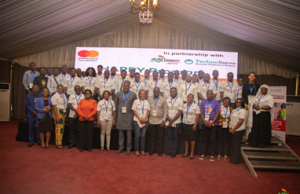
By Elizabeth PUNSU, Kumasi
Stakeholders in the agribusiness sector have cautioned that persistent challenges in skills development and access to finance continue to undermine agricultural productivity, despite the industry’s vast potential.

Speaking at a panel discussion during the Harnessing Agricultural Productivity and Prosperity for Youth (HAPPY) Agri-SME and Finance Summit – organised by the Mastercard Foundation in partnership with Agri.Impact Ltd. and TechnoServe – Chief Executive-Agri Commercial Services Ltd. Kwabena Adu-Gyamfi described smallholder productivity as “worryingly low”.
He noted that after years of training interventions little progress has been made, blaming a disconnect between classroom theory and practical fieldwork. His company’s graduate recruitment and training success rate currently stands at only 12 per cent, with most successful recruits being those with a farming background.
“After over 15 years, we are still struggling to get the right skills. Young people come from universities and agricultural colleges, but sometimes you ask yourself what’s happening there,” he lamented.
Mr. Adu-Gyamfi also stressed that financing remains a critical barrier as agriculture is widely perceived as high-risk. He argued, however, that risks such as drought, storms and land tenure issues could be managed with better systems.
Victoria Agyeman Tuffour, Chief Executive-Akoko Solutions – a local agribusiness that processes poultry feed, reiterated the financing challenge. She explained that banks’ limited understanding of the sector, coupled with high lending rates, continues to stifle growth.
“One of the principal constraints to growth is access to finance and the rate at which financial institutions are lending to agriculture. Agric should not be treated like any other sector when it comes to lending,” she said, calling for tailored credit products to support the industry.
Despite these obstacles, both speakers emphasised the sector’s profitability – citing strong opportunities in certified feed production for both domestic and export markets.
As part of the HAPPY programme, beneficiary Agri-SMEs and microenterprises are receiving support from a Catalytic Fund and Micro Grants to procure equipment such as tractors and harvesters, as well as working capital to improve processing and expand market access.
The initiative aims to boost productivity, sustainability and inclusive growth, positioning agribusiness as a driver of dignified employment for youth – particularly young women – across key value chains.
The post Agriculture sector still hampered by skills gap, financing – stakeholders appeared first on The Business & Financial Times.
Read Full Story























Facebook
Twitter
Pinterest
Instagram
Google+
YouTube
LinkedIn
RSS